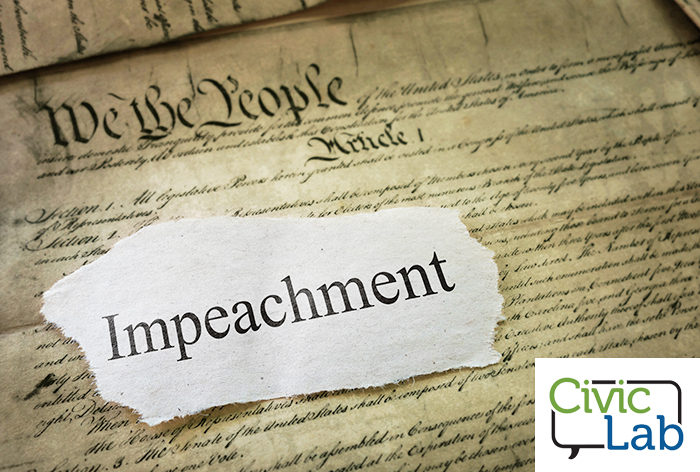Civic Lab Online: What is impeachment?
Posted on February 1, 2021 at 6:00 am

About Civic Lab Online
Civic Lab Online provides information on issues facing our community for you to explore. Take a look at thought-provoking materials for teens and adults that allow us to engage in open conversation and grow together as a community. You’ll find all past topics on the Civic Lab Online web page.
What is impeachment?
The news of the second impeachment of President Donald Trump has resulted in much news coverage about the possible results. Here’s what we know about the process and history of impeachment in the United States.
Fast Facts

What does it mean to be impeached? Who can be impeached? How does the impeachment process work?
Impeachment is the formal accusation of serious misconduct against a government official. A legislative body votes on whether to accuse (impeach) the person, who can remain in office until he or she has been tried and found guilty of the charges. Impeachment does not mean “removed from office”; however, if an impeached official is found guilty, then removal from office can be a consequence.
The House of Representatives has the sole power to bring charges of impeachment against the president, vice president, or other civilian officials of the United States government (except members of Congress). Committees are appointed in the House to hold investigations, compile evidence, and in a committee markup (process in which committees and subcommittees debate, amend, and rewrite articles or legislation), create the articles of impeachment. Once the articles of impeachment have been drafted, the House votes on them. If a majority of the House votes to formally accuse the official, then the official is considered impeached and the process continues. The House sends the approved articles of impeachment to the Senate.
The Senate then sits as a court to hear the charges against the impeached official. A vote of at least two-thirds of the Senate is required for conviction. If the Senate convicts, then the official is found guilty and will face the subsequent consequences.
The vice president presides over impeachment charges in the Senate, unless the accused official is the president. In that case, the chief justice of the United States presides. The Constitution makes this provision because the vice president would assume the role of president if the sitting president were found guilty. The current chief justice in 2021 is John Roberts. He holds the highest judicial position in the U.S.
The Constitution specifies that officials shall be removed from office after impeachment and conviction of “treason, bribery, or other high crimes and misdemeanors.” Officials can be impeached for breaking the law, a severe abuse of power, or grave misconduct in office. However, impeachment is a political trial, not a criminal one. What constitutes “high crimes and misdemeanors” was deliberately undefined in the Constitution so that a president who abuses public trust could be removed even if societal norms and laws change. When he was a representative in the House, President Gerald Ford said, “An impeachable offense is whatever a majority of the House of Representatives considers it to be at a given moment in history.” An official cannot be impeached for losing the approval of citizens or other government officials, or doing a poor job, which is called maladministration.
What are the consequences if an impeached official is found guilty by the Senate?
If the Senate reaches a two-thirds majority and declares an official guilty, the official can be removed from office and/or barred from ever holding public office again.
If the official has broken the law, he or she may also face criminal charges in a traditional courtroom.
How often are officials impeached in the U.S.? Has a president been removed from office?
Not very often. Only 20 people have been impeached in the U.S. and most have been federal judges.
Three presidents have been impeached in the U.S.
In 1868, President Andrew Johnson was the first president to be impeached. He tried to gain more control over the army by firing his secretary of war without Congress’s approval, in violation of a law at the time. The Senate declared him not guilty by one vote, and he served out the rest of his presidency.
President Richard Nixon was never impeached; he resigned after the articles of impeachment against him were drawn up. He would have been charged with obstruction of justice, abuse of power, and contempt of Congress. The chance that he would be the first president removed from office was high, so he resigned, and Vice President Gerald Ford was sworn in. He is the only U.S. president so far to have resigned from office.
In 1998 at the end of his second term, President Bill Clinton became the second president to be impeached for two charges, perjury (lying under oath in court) about his relationship with an intern and obstruction of justice (encouraging others to make false statements and cover evidence). The Senate acquitted him by a close margin.
On December 18, 2019, President Donald Trump became the third president to be impeached. He was charged with abuse of power and obstruction of Congress for withholding funds—that Congress had directed to the Ukraine—unless the Ukrainian president announced an investigation into Joe and Hunter Biden, board members of a Ukrainian energy company. Former Vice President Joe Biden was Trump’s rival for the presidential race in 2020. On February 5, 2020, the Senate acquitted Trump on both counts.
On Wednesday, January 13, 2021, President Donald Trump became the first president to be impeached for a second time. The articles of impeachment accuse him of incitement to insurrection, under the umbrella of high crimes and misdemeanors. Cited in the articles as conduct endangering national security are statements the president made about the 2020 election results being fraudulent, his phone call to the secretary of state in Georgia urging him to “find” votes, and his statements during a rally in Washington, D.C., shortly before a crowd breached the U.S. Capitol building. The Senate trial will not proceed until after Trump has already left office. If the Senate convicts, then he can be barred from ever again holding public office under the 14th Amendment (his presidential pension and secret service protection would not be affected).
Read. Watch. Listen.

READ
Baker, Peter; Engel, Jeffery A.; Meacham, Jon, Naftali Timothy. Impeachment: An American History. Modern Library, 2018.
Four experts on the American presidency review three impeachment cases from history: against Presidents Andrew Johnson, Richard Nixon, and Bill Clinton. These three cases highlight factors beyond the president’s behavior that impact the likelihood and outcome of an impeachment: the president’s relationship with Congress, the power and resilience of the office itself, and the polarization of the moment.
Brettschneider, Corey. On Impeachment: The Presidency on Trial. Penguin Liberty, 2020.
A short, accessible collection of key historic writings about presidential impeachment. Readers will have a scope of perspectives from the Constitution, George Washington, Alexander Hamilton, Frederick Douglass, Barbara Jordan, Gerald Ford, Dianne Feinstein, and more.

WATCH
A Conversation with the Authors of, “IMPEACHMENT: An American History.” Salon Series, John Brademas Center of New York University, NYU, Washington, DC, and Random House, November 27, 2018. https://youtu.be/eCQ5X6MKLG8
The authors of Impeachment (see the Read section for information on the book) discuss the history behind past presidential impeachments, the diaries of partisan and non-partisan participants, what “high crimes and misdemeanors” meant to past voters of the House, and why the purpose of impeachment is not to express dislike of the president.
Gendler, Alex. How does impeachment work? TED-Ed, Aug 24, 2017. https://www.youtube.com/watch?v=hSszixvo7d8
In this Ted-ED video, Alex Gendler shares a brief explanation of why we have impeachment, what the process is, and what the consequences can be.
“Going to the Devil: the Impeachment of 1868.” DVD, Teaching Company, The Great Courses, 2020. https://catalog.scld.org/redirect
This is a narrative documentary of the turbulent events leading up to and through the impeachment of President Andrew Johnson. You’ll learn firsthand of events from the characters themselves, such as Thaddeus Stevens, Charles Sumner, and others who were involved. With back stabbings, acts of violence, and twists and turns, the factual history of this case unfolds with all the drama of modern fiction.

LISTEN
“Impeachment 2.0.” Article 11: Inside Impeachment, NBC News, 13 January 2021. Podcast. https://www.nbcnews.com/podcast/inside-impeachment/impeachment-2-0-n1254214
Host Steve Kornacki talks with Leigh Ann Caldwell, NBC News’s Capitol Hill correspondent, about the House vote to impeach Donald Trump for a second time. Caldwell covers differing opinions between Republicans who believe that impeachment will further divide America and result in violence and Republicans who believe that the president’s conduct is impeachable. Caldwell also explains how a Senate trial will proceed for a president who is no longer in office.
Totenburg, Nina. “Can Trump Pardon Himself?” All Things Considered, National Public Radio, 8 January 2021. https://www.npr.org/2021/01/08/954994502/can-trump-pardon-himself
This discussion looks at the differing legal opinions on the unprecedented question of whether a president can legally pardon himself while in office and, if so, under which circumstances.
Digital Resources

Opposing Viewpoints in Context
Access this resource at www.scld.org/opposing-viewpoints/.
Print & Other Materials in Our Catalog
Search our catalog for books, large print, eBooks, and audiobooks at www.scld.org/catalog.
Downloadable Documents
Fast Facts: What is impeachment?
Read.Watch.Listen: What is impeachment?
Additional Resources: Flow chart for impeachment
Tags: adults, civic lab, government, online, politics
